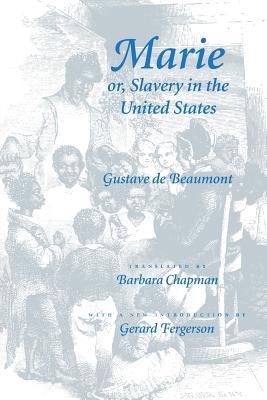Gustave de Beaumont's 1835 work, Marie, or Slavery in the United States is structured as a fascinating essay on race interwoven with a novel. It is the story of socially forbidden love between an idealistic young Frenchman and an apparently white American woman with African ancestry. The couple's idealism fades as they repeatedly face racial prejudice and violence, and are eventually forced to seek shelter among exiled Cherokee people. Notable as the first abolitionist novel to focus on racial prejudice rather than bondage as a social evil, Beaumont's work was also the first to link prejudice against Native Americans to prejudice against blacks. This translation, with a new introduction by Gerard Fergerson, provides modern readers with interesting insights into the inconsistencies and injustices of democratic Jacksonian society.

Marie Or, Slavery in the United States: A Novel of Jacksonian America
Gustave de Beaumont's 1835 work, Marie, or Slavery in the United States is structured as a fascinating essay on race interwoven with a novel. It is the story of socially forbidden love between an idealistic young Frenchman and an apparently white American woman with African ancestry. The couple's idealism fades as they repeatedly face racial prejudice and violence, and are eventually forced to seek shelter among exiled Cherokee people. Notable as the first abolitionist novel to focus on racial prejudice rather than bondage as a social evil, Beaumont's work was also the first to link prejudice against Native Americans to prejudice against blacks. This translation, with a new introduction by Gerard Fergerson, provides modern readers with interesting insights into the inconsistencies and injustices of democratic Jacksonian society.